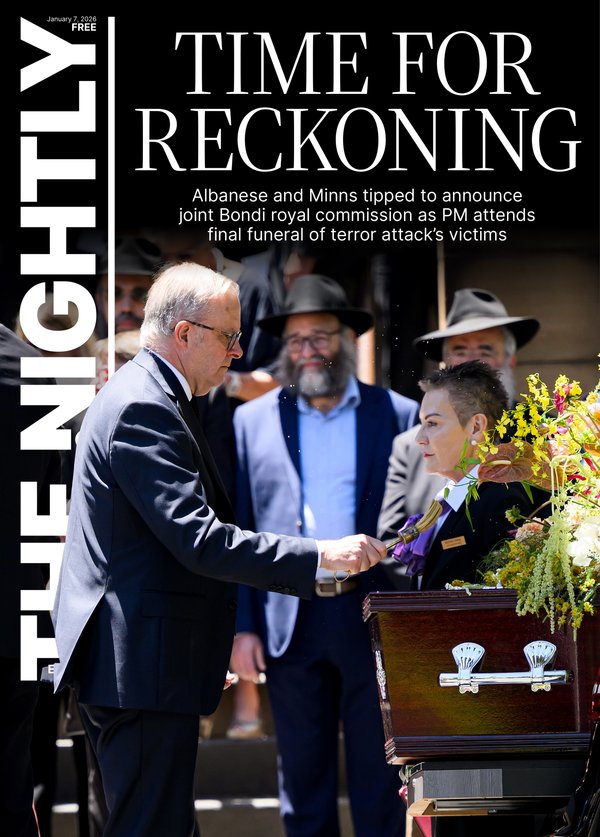Civil War review: Alex Garland’s visceral and distressing anti-war movie packs a massive punch
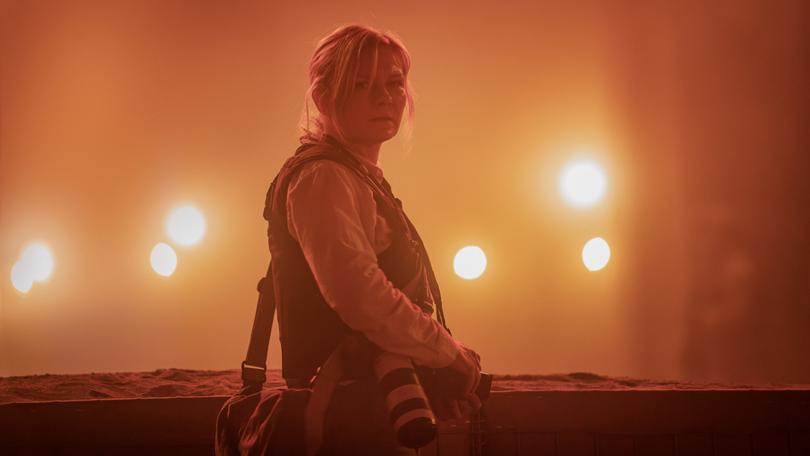
The idea of watching a movie about modern-day America at war with itself might feel like a masochistic exercise that could trigger your anxiety.
And it will.
British author and filmmaker Alex Garland’s distressing action drama is traumatic – and maybe that’s the last thing you want to be confronted with in an American election year – but it’s also a punchy and smart movie that declares unequivocally there is no glory in war.
Sign up to The Nightly's newsletters.
Get the first look at the digital newspaper, curated daily stories and breaking headlines delivered to your inbox.
By continuing you agree to our Terms and Privacy Policy.It’s a warning and a provocation. It doesn’t have to be a roadmap.
When a flag is caught billowing in the wind, it’s a menacing shot. The imagery laden with all the deaths that nativism has wrought.
There is no moment of military triumph scored to sweeping music, no gun-toting heroes lit from behind as if with halos.
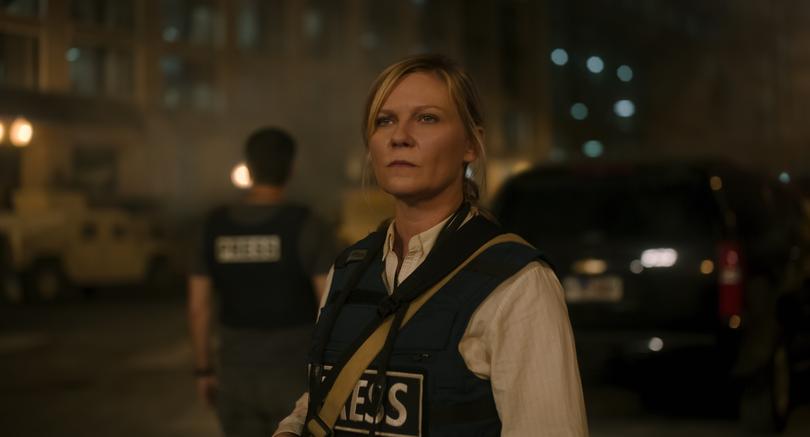
In Civil War, the protagonists, the closest the film has to heroes, are four journalists – three veterans Kirsten Dunst as Lee, Wagner Moura as Joel and Stephen McKinley Henderson as Sammy, and Cailee Spaeny as novice photographer Jessie.
Lee is an unsentimental photojournalist who has seen and captured horrors in conflicts all over the world. She has photographed a man doused with fuel and set alight, the fear in his eyes. But she doesn’t intervene. It’s not her job to intervene, merely record and disseminate.
The last place Lee and Joel expected to become a warzone is the US, which has descended into a civil war between a secessionist alliance between California and Texas, and the fascistic government bunkered in Washington D.C. There is a Florida breakaway group.
Setting off from New York City to DC in an attempt to interview the besieged president (who hasn’t spoken to the press in over a year and who Joel believes will be dead within the month), the pair reluctantly agree to give a ride to Sammy, an older and less mobile journalist.
Freshman photographer Jessie, who idolises Lee, also wrangles a seat in their car. The normally three-hour drive will take much, much longer and the group will be confronted with myriad challenges along the way.
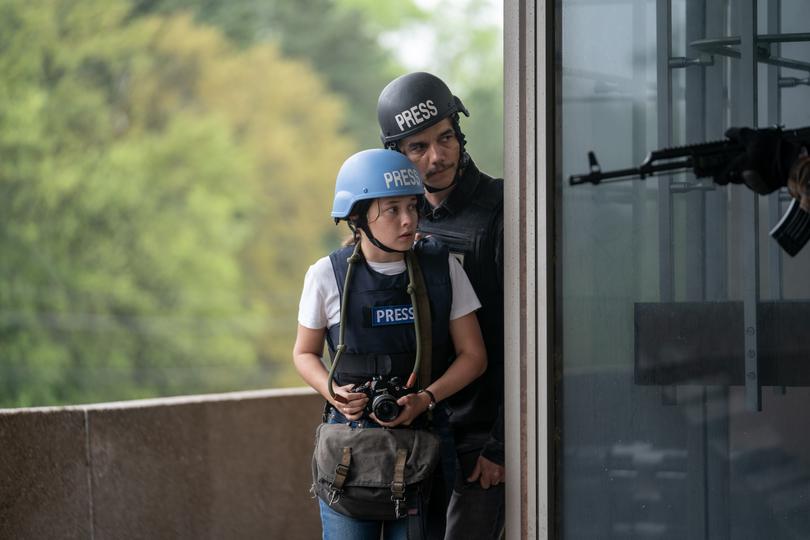
Through his work, Garland (Ex Machina, Annihilation, Devs and Men) plays with big ideas in conversation with social anxieties and there’s no bigger and thornier one than political division and extremism.
While the film does not feed you the backstory to how blue state California and red state Texas came to be friends or which political party the president (Nick Offerman) belongs to, Garland’s point is that it almost doesn’t matter. Division is the seed of this discord, the inability for people to stop, listen and empathise.
The dehumanisation of the “other” is what leads to conflict and the deaths of civilians and combatants. And it’s at its most heightened when the strife is internal. The more personal it is, the more pain it inflicts.
Although there are some allusions to present-day figures – exposition is cleverly threaded in some conversations about the president’s “third term”, his disbandment of the FBI and we see him gearing up for a TV address in which he lies about “the greatest victory in the history of mankind”.
The front is in Charlottesville, where in the real world, neo-Nazis marched in 2017.
When the journalists come across forces on the road, it’s rarely clear which “side” they’re on, and that goes for a particularly horrific encounter with a couple of men (Dunst’s husband Jesse Plemons plays one of them) and a pit of bodies.
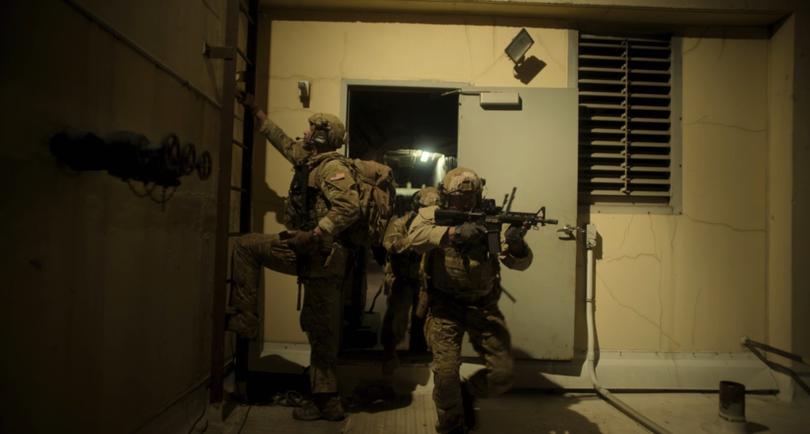
The performances are all terrific, especially Dunst as the weary photographer whose trademark stoicism and detachment are tested when the newbie Jessie is placed in peril.
The world Garland created in Civil War is familiar but the filmmaker has weaponised it by using those tropes (highways littered with abandoned cars, armoured tanks storming barricades on city streets, the value of Canadian dollars) but presenting them with the similar coolness Lee strived for in her approach.
It’s shocking but it’s not emotional in the way war movies can sometimes coddle its audience, instructing them to feel certain things at certain points.
The final act, a battle sequence, is so visceral and overwhelming it will take days to process. You’ll want to cry but find you can’t choke out the tears because there is no release. Catharsis is comforting and there is no comfort to be found here.
Special mention must go to Civil War’s sound design. Its discordant helicopter engines roaring overhead and the almost dull, incessant exchange of gunfire is penetrating, evoking the dispassionate mechanisms of war.
Everything here is designed to confront you with a future that feels alarmingly possible. But it doesn’t have to be. Nor the wars being waged right now, where civilians pay with their lives for the decisions of cowardly men.
Civil War is not merely entertainment, diversion or a distraction. It’s a declaration for pacifism.
Rating: 4/5
Civil War is in cinemas on April 11

